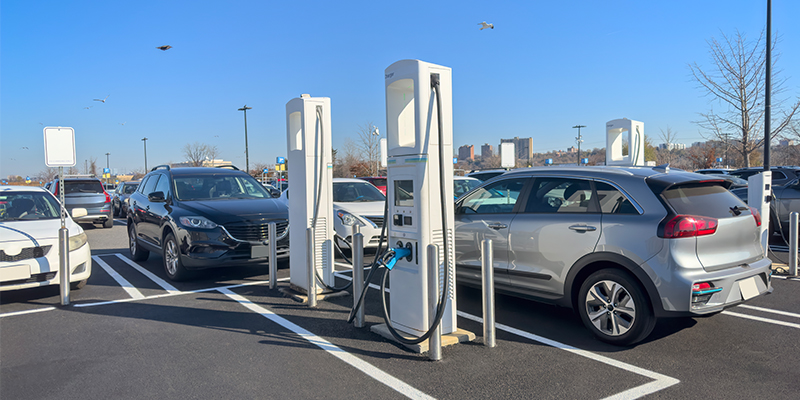The transportation sector accounts for 28% of greenhouse gas emissions – the highest percentage of any sector, reports the U.S. Environmental Protection Agency. The result of this has been greater public and private sector demand and interest in a national network of charging stations to support the use of more electric vehicles (EVs), including trucks, also known as transportation electrification.
During NAIOP’s Chapter Leadership and Legislative Retreat this week in Washington, D.C., chapter leaders and staff attended a session that recognized the leading role of state governments in establishing a national network of public EV charging stations following the passage of the bipartisan Infrastructure Investment and Jobs Act of 2021. Anne Blair, vice president of policy at the Electrification Coalition, highlighted this and its impact on the commercial real estate industry following the allocation of $7.5 billion from the federal act to establish this national network. The federal allocation is broken into two parts: $5 billion for states under a national EV infrastructure (NEVI) formula and $2.5 billion in charging and fueling infrastructure (CFI) grants.
After stating the case for transportation electrification as a cleaner alternative to oil-based fuels, Blair provided an overview of federal funding investments in the manufacturing and production of EV materials, such as battery production in the southeastern states. Her presentation also included a review of available grant and tax credit programs for heavy-duty trucks and port operations.
Blair then focused on the states’ progress in utilizing the $5 billion in NEVI funding. States are presently in the initial stages of the multiyear process for establishing this national system of EV charging stations that shall be deployed no more than 50 miles away from one another along highways and no more than one mile from an exit. According to the Electrification Coalition, 15 states have currently made awards for 246 EV charging stations.
The success of multicity applications for CFI grants as part of this national EV system was briefly highlighted by Blair before turning to state initiatives encouraging the sale and use of EVs by certain dates. These initiatives are also known as Advanced Clean Car (ACC) and Advanced Clean Truck (ACT). Blair’s presentation noted that eight states have enacted EV road usage fees in order to make up for lost revenue from highway gas tax.
- the availability of federal and state funds and incentives for non-public or private sector use,
- unfunded EV charging station mandates by federal, state and local governments,
- the developing technology and efficiencies in EV charging stations,
- the reliability of the grid to transmit the necessary power for transportation electrification, including other initiatives to reduce the usage of fossil fuels, and
- the capacity of public and private utilities to generate electricity to meet future demand.
There are, however, some developing concerns with EVs and transportation electrification for commercial real estate and the private sector. These concerns include:
In addition, states are partnering together to coordinate the efficient deployment and public access to EV charging stations across state lines. For example, Midwest governors have entered a regional memorandum of understanding (MOU) “to collaborate on electric vehicle charging infrastructure.” The MOU is also intended to ensure the collective strength of the states to compete for federal funds and private investments. The states signing the MOU are Illinois, Indiana, Michigan, Minnesota and Wisconsin.
States are and will continue to play a central role in establishing the EV charging infrastructure for transportation electrification and the associated concerns to support the expanded use of EVs. NAIOP members will need to remain engaged in these state efforts to ensure balanced, sustainable and viable approaches are achieved.














